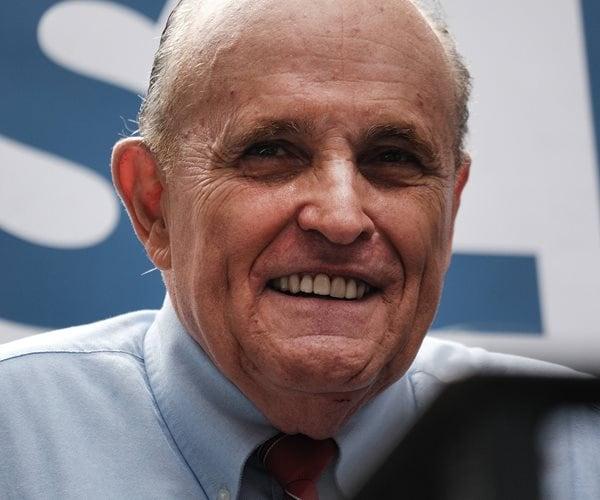Bernard Kerik's Legacy: Leading NYC Through Crisis

Table of Contents
Kerik's Rise to Power and Pre-9/11 Achievements
Bernard Kerik's ascent within the New York City Police Department (NYPD) was swift and impressive, particularly under Mayor Rudy Giuliani's administration. He rose through the ranks, demonstrating a reputation for decisive action and a tough-on-crime approach that resonated with the city’s leadership. His contributions to the NYPD's crime reduction strategies were substantial, solidifying his image as an effective and results-oriented leader within the law enforcement community.
- Dramatic Crime Reduction: Kerik oversaw significant drops in crime rates across several New York City boroughs, particularly in areas previously plagued by high rates of violent crime. His strategies involved innovative policing techniques and a strong focus on community engagement.
- Strategic Deployments: He implemented effective deployment strategies, optimizing police resources to maximize their impact on crime hotspots. This included targeted initiatives addressing specific crime types and locations.
- Strong Giuliani Relationship: Kerik’s close working relationship with Mayor Giuliani was instrumental to his rise. Giuliani's emphasis on law and order created a fertile ground for Kerik’s tough-on-crime strategies. His appointment as Police Commissioner reflected this alignment of political priorities and policing philosophies.
Leadership During and After 9/11
The events of September 11th, 2001, irrevocably shaped Kerik's legacy. In the immediate aftermath of the World Trade Center attacks, he played a crucial role in the city's emergency response, coordinating efforts across various agencies during a time of unprecedented chaos and devastation. His leadership during this crisis cemented his national profile.
- Emergency Response Coordination: Kerik's role in coordinating emergency services, securing the city, and establishing communication channels was widely praised in the chaotic days following the attacks.
- Recovery Efforts: He was heavily involved in the early recovery efforts, working alongside other officials to address the immediate needs of the city and its residents. His presence provided a visible symbol of leadership during a time of profound uncertainty.
- Influence on Post-9/11 Security: His experiences during and immediately following 9/11 directly informed his approach to homeland security, significantly shaping his subsequent role within the Department of Homeland Security.
The Homeland Security Appointment and Subsequent Fall from Grace
Kerik's appointment to the Department of Homeland Security under President George W. Bush, while initially seen as a testament to his 9/11 leadership, ultimately marked the beginning of his dramatic downfall. Subsequent investigations uncovered a pattern of ethics violations and financial irregularities that led to his resignation and eventual criminal conviction.
- Ethics Violations and Financial Irregularities: Allegations ranged from failing to pay taxes to accepting gifts and favors, ultimately revealing significant breaches of ethics and potential corruption.
- Federal Investigation and Legal Proceedings: The ensuing federal investigation culminated in multiple charges, a trial, and a subsequent conviction for multiple felonies.
- Impact on Public Trust: Kerik's conviction significantly damaged public trust in government and highlighted the importance of ethical conduct in high-level leadership positions. His story serves as a cautionary tale about the consequences of unchecked ambition and ethical lapses.
Analyzing the Contradictions in Kerik's Legacy
Bernard Kerik's story presents a stark and compelling paradox. His significant achievements in crime reduction and his crucial role in the immediate aftermath of 9/11 are undeniable. However, these contributions are inextricably linked to his subsequent ethical failures and legal troubles. This raises crucial questions about the nature of leadership, the balance between accomplishments and character, and the long-term consequences of ethical lapses. Can a leader’s positive actions outweigh their moral failings? What are the critical ethical considerations that should guide individuals in positions of public trust? The answers to these questions are essential for understanding Kerik's legacy and shaping future leadership.
Conclusion
Bernard Kerik's legacy is undeniably complex and deeply controversial. He demonstrated remarkable leadership during times of extreme crisis, particularly in the wake of 9/11. Yet, his subsequent fall from grace, marked by serious ethical violations and a criminal conviction, casts a long shadow over his achievements. Understanding the full context of his story—the successes and the failures—offers valuable insights into crisis management, the importance of ethical leadership, and the enduring responsibility that comes with public service. To further explore this intricate narrative, consider researching additional resources on crisis management, leadership ethics, and the complexities of public service. Understanding Bernard Kerik’s legacy provides crucial insights into effective crisis management and the importance of ethical leadership in times of both peace and turmoil.

Featured Posts
-
 Kostenlose Unterkunft Lockt Neue Bewohner In Diese Deutsche Stadt
May 31, 2025
Kostenlose Unterkunft Lockt Neue Bewohner In Diese Deutsche Stadt
May 31, 2025 -
 Analysis Elon Musks Departure From The Trump Administration
May 31, 2025
Analysis Elon Musks Departure From The Trump Administration
May 31, 2025 -
 The Influence Of Climate Change On Rainfall Patterns In Western Massachusetts
May 31, 2025
The Influence Of Climate Change On Rainfall Patterns In Western Massachusetts
May 31, 2025 -
 World Health Organization Warns Of New Covid 19 Variant Driving Up Cases
May 31, 2025
World Health Organization Warns Of New Covid 19 Variant Driving Up Cases
May 31, 2025 -
 Cycle News Magazine 2025 Issue 17 In Depth Reports And Exclusive Interviews
May 31, 2025
Cycle News Magazine 2025 Issue 17 In Depth Reports And Exclusive Interviews
May 31, 2025
